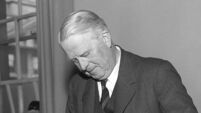Book review: Cameras, microphones, and money used to isolate Al-Fayed’s victims

Alison Kervin's book examines how Al-Fayed first groomed, then humiliated his victims — who are said to number in the hundreds — over a period of several decades.
- The Monster of Harrods: Al-Fayed and the secret, shameful history of a British institution
- Author: Alison Kervin
- Publisher: HarperCollins Price: €22.99
BOOKS & MORE
Check out our Books Hub where you will find the latest news, reviews, features, opinions and analysis on all things books from the Irish Examiner's team of specialist writers, columnists and contributors.







